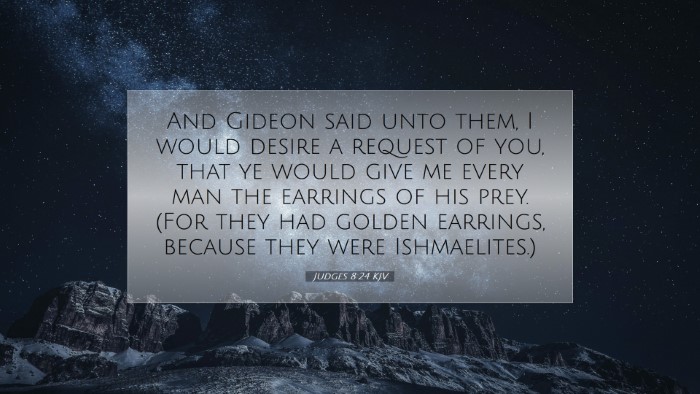Commentary on Judges 8:24
In Judges 8:24, we encounter a significant moment in the narrative of Gideon and his leadership over Israel. This verse states, "And Gideon said unto them, I would desire a request of you, that ye would give me every man the earrings of his prey." This request opens several avenues for theological and practical reflection, worthy of our deep contemplation.
Contextual Background
The context in which Gideon makes this request is critical. After the victory over Midian, the people of Israel recognize Gideon's leadership and, as a result, seek to honor him. However, Gideon's response indicates a humility and a political acuity that provides us with a lens to view the intersection of faith and leadership.
Theological Reflections
- The Nature of Leadership: Biblical leadership is rooted in servanthood. Gideon, despite his high status following a great victory, refuses to take honor for himself in a manner that would detract from God's glory. Instead, he redirects attention from himself to the Lord, knowing that true victory belongs to God.
- The Danger of Materialism: Gideon's request for the earrings symbolizes the subtle danger of materialism in leadership. While he seeks what is due from the spoils of war, there is a cautionary tale about the allure of wealth and its potential to distract leaders from their divine mission.
- The Call for Generosity: Gideon's request can also be seen as a call to collective generosity. He asks for the spoils not for personal enrichment but for a cause greater than himself, which prepares the groundwork for the creation of an ephod, a religious artifact that would fulfill future needs.
Insights from Public Domain Commentaries
Matthew Henry observes that Gideon’s request “was a means of establishing a standard by which the people could remember the Lord’s deliverance.” The earrings, typically worn by Midianites as symbols of wealth, become tokens of remembrance for God’s power. This aligns with the biblical narrative of God's covenant with His people, where physical tokens serve as a reminder of divine provision.
Albert Barnes highlights the implications of the earrings when he notes, “The spoils were viewed not merely as personal gain but also as a means for communal benefit.” He emphasizes the importance of sharing blessings among the community, thus reinforcing communal bonds and supporting worship practices. Such sharing also empowers the community to remember and recount the acts of God in their lives.
Adam Clarke elaborates on the cultural implications by indicating that yielding the earrings was a common practice among vanquished foes. He points out that Gideon’s request not only reflects his leadership role but also symbolizes a way for Israel to reclaim dignity from their conquerors. The earrings thus serve as a testament to Israel's struggle and victory, merging their material culture with their spiritual narrative.
Practical Applications
- Encouraging Generosity in Leadership: Leaders should seek to empower their communities through acts of shared resources and inclusive decision-making. This reflects a genuine desire to uplift rather than overwhelm.
- Moral Reflection on Property and Provision: The engraving of one’s identity through material possessions requires careful stewardship. This passage invites leaders and congregations alike to assess how they honor God with their resources.
- Collective Memory and Worship: Communities should foster rituals that remember God’s past interventions in their lives, transforming communal practice into a living memory of divine faithfulness.
Conclusion
Judges 8:24 serves as a compelling testament to Gideon’s humility and strategic foresight as a leader. His request for the earrings embodies a deeper relationship with God; it invites both leaders and congregations to reflect on the essence of shared wealth and worship. Furthermore, the ecclesiological implications remind us that every victory we achieve should ultimately point back to the one who grants it. Understanding this verse in its full context enriches our journey in faith, encouraging us to be both receivers and givers of God’s grace.


